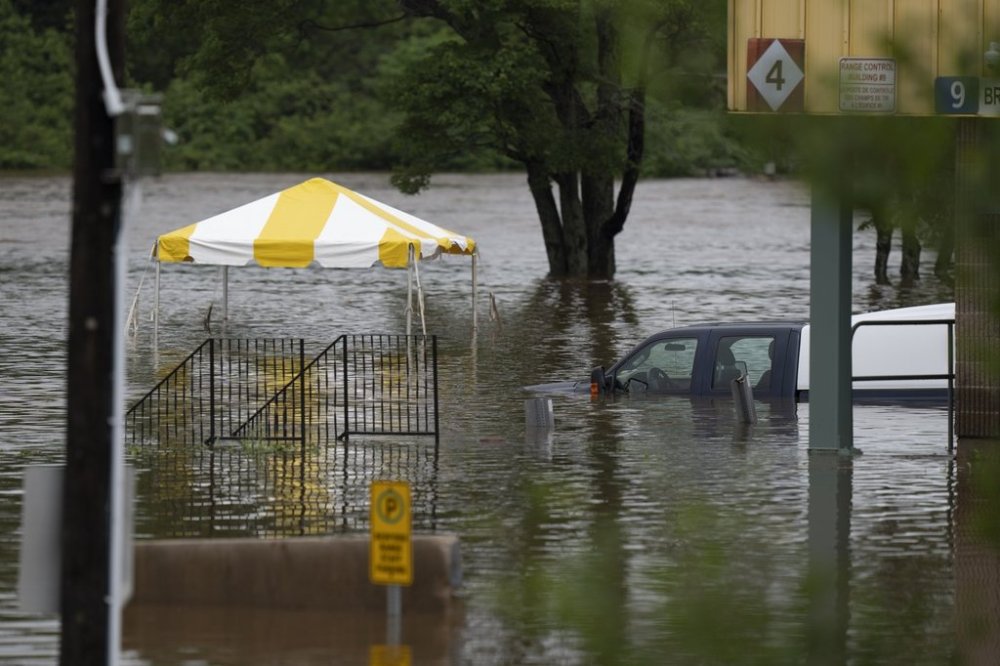Science
Canada Urged to Enhance Weather Service Amid U.S. Funding Cuts

A recent report highlights the urgent need for Canada to strengthen its weather service as the United States reduces funding for climate and weather-related initiatives. The assessment, prepared for Environment and Climate Change Canada, emphasizes the importance of developing a coordinated flash flood warning system and enhancing partnerships with European weather agencies.
The report, produced by the Council of Canadian Academies, notes that significant cuts to the National Oceanic and Atmospheric Administration (NOAA) could impact various weather and water monitoring efforts across Canada, particularly in regions such as the Arctic and the Great Lakes. Canada relies on NOAA for crucial data, and recent funding reductions threaten the availability of this information.
Within its findings, the report underscores the necessity of maintaining Canada’s observation network, especially as climate change and advancements in artificial intelligence transform how forecasts are generated and delivered. Currently, there are considerable gaps in this network, particularly in northern areas, where weather stations can be separated by hundreds of kilometres, resulting in missed weather data.
The implications of climate change are a central theme in the report, which indicates that the demand for timely and accurate extreme weather warnings is on the rise. Although the report does not provide formal recommendations, it expresses a clear need for an integrated flood forecasting system, highlighting the weaknesses in Canada’s existing patchwork of warning and response initiatives.
As extreme weather events become more frequent, the report points out that both the physical weather infrastructure and budget resources in Canada are under increasing strain. Notably, “program spending on hydro-meteorological services has remained relatively static over the past five years,” indicating a concerning lack of investment in this critical area.
The federal government commissioned the report to explore essential functions of the public hydro-meteorological service and determine how it can adapt to meet escalating demands. The recent changes at NOAA are repeatedly referenced throughout the report. With the U.S. administration’s funding cuts and new restrictions on international collaborations for its scientists, the report warns that Canada’s access to rich remote sensing data may be at risk.
This situation could severely hinder Canada’s capacity to produce accurate and precise weather and climate analyses. The report further states, “Reduced funding for NOAA and its uncertain position as an active data-sharing partner further emphasize the need to support Canada’s data sovereignty and points to the potential for greater collaboration with service providers in Europe.”
In addressing the role of artificial intelligence in forecasting, the report acknowledges its potential to enhance the resolution and accuracy of predictions. However, it cautions that AI models must be combined with proven traditional modelling methods. The opaque decision-making processes of AI can lead to failures in unprecedented scenarios, particularly those driven by climate change where historical data may no longer apply.
“Future forecasting systems that integrate AI and traditional physics-based modelling will help ensure accurate, reliable, and more frequent predictions,” the report concludes.
This assessment, first published on September 11, 2025, underscores the pressing need for Canada to adapt its weather service to the changing climate landscape and the challenges posed by external funding cuts. The findings call for decisive action to protect the nation’s weather monitoring capabilities and to better prepare for the increasing frequency of extreme weather events.
-

 Education3 months ago
Education3 months agoBrandon University’s Failed $5 Million Project Sparks Oversight Review
-

 Science4 months ago
Science4 months agoMicrosoft Confirms U.S. Law Overrules Canadian Data Sovereignty
-

 Lifestyle3 months ago
Lifestyle3 months agoWinnipeg Celebrates Culinary Creativity During Le Burger Week 2025
-

 Health4 months ago
Health4 months agoMontreal’s Groupe Marcelle Leads Canadian Cosmetic Industry Growth
-

 Science4 months ago
Science4 months agoTech Innovator Amandipp Singh Transforms Hiring for Disabled
-

 Technology4 months ago
Technology4 months agoDragon Ball: Sparking! Zero Launching on Switch and Switch 2 This November
-

 Education4 months ago
Education4 months agoRed River College Launches New Programs to Address Industry Needs
-

 Business3 months ago
Business3 months agoRocket Lab Reports Strong Q2 2025 Revenue Growth and Future Plans
-

 Technology4 months ago
Technology4 months agoGoogle Pixel 10 Pro Fold Specs Unveiled Ahead of Launch
-

 Technology2 months ago
Technology2 months agoDiscord Faces Serious Security Breach Affecting Millions
-

 Education4 months ago
Education4 months agoAlberta Teachers’ Strike: Potential Impacts on Students and Families
-

 Education4 months ago
Education4 months agoNew SĆIȺNEW̱ SṮEȽIṮḴEȽ Elementary Opens in Langford for 2025/2026 Year
-

 Science4 months ago
Science4 months agoChina’s Wukong Spacesuit Sets New Standard for AI in Space
-

 Business4 months ago
Business4 months agoBNA Brewing to Open New Bowling Alley in Downtown Penticton
-

 Business4 months ago
Business4 months agoNew Estimates Reveal ChatGPT-5 Energy Use Could Soar
-

 Technology4 months ago
Technology4 months agoWorld of Warcraft Players Buzz Over 19-Quest Bee Challenge
-

 Business4 months ago
Business4 months agoDawson City Residents Rally Around Buy Canadian Movement
-

 Technology2 months ago
Technology2 months agoHuawei MatePad 12X Redefines Tablet Experience for Professionals
-

 Technology4 months ago
Technology4 months agoFuture Entertainment Launches DDoD with Gameplay Trailer Showcase
-

 Top Stories3 months ago
Top Stories3 months agoBlue Jays Shift José Berríos to Bullpen Ahead of Playoffs
-

 Technology4 months ago
Technology4 months agoGlobal Launch of Ragnarok M: Classic Set for September 3, 2025
-

 Technology4 months ago
Technology4 months agoInnovative 140W GaN Travel Adapter Combines Power and Convenience
-

 Science4 months ago
Science4 months agoXi Labs Innovates with New AI Operating System Set for 2025 Launch
-

 Technology4 months ago
Technology4 months agoNew IDR01 Smart Ring Offers Advanced Sports Tracking for $169










